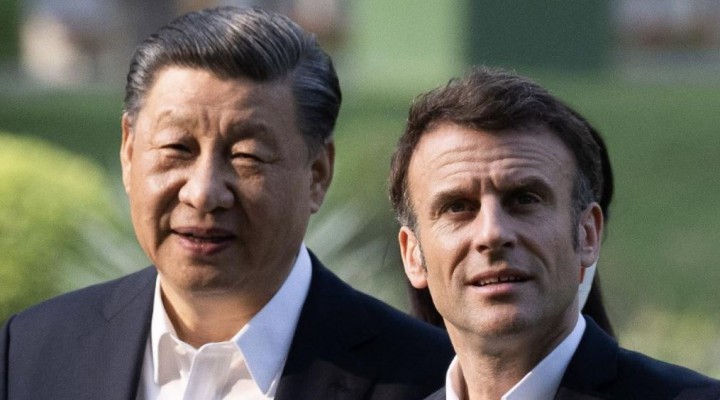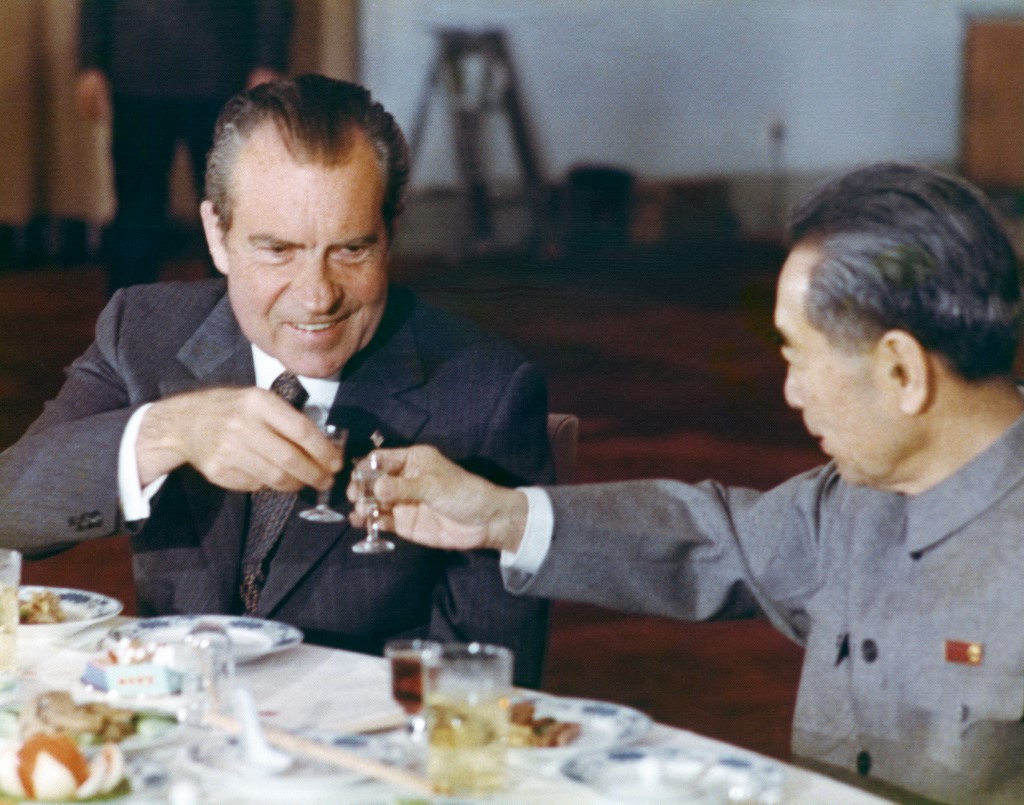Europe standing up to the US on Taiwan is common sense not heresy

When Macron called for European strategic autonomy away from Washington, he was only saying out loud what many in the EU increasingly think about US-China tensions
“When all men think alike, no one thinks very much.”
This quote, attributed to late US columnist Walter Lippmann, summarises at its best the latest transatlantic and intra-European row.
In contrast to German Chancellor Olaf Scholtz’s visit to China in November, French President Emmanuel Macron’s recent visit has caused a large backlash among western chancelleries and in the mainstream media. This is particularly due to two interviews Macron gave, to Politico and Les Echos respectively. He uttered apparently “transgressive” words – but they have been received as heretical.
Macron said that Europe must reduce its dependency on the United States and avoid getting dragged into a confrontation between China and the US over Taiwan. He claimed that: “The paradox would be that, overcome with panic, we believe we are just America’s followers… The question Europeans need to answer… is it in our interest to accelerate [a crisis] on Taiwan? No. The worse thing would be to think that we Europeans must become followers on this topic and take our cue from the US agenda and a Chinese overreaction.”
The EU president, Charles Michel, added that European leaders were becoming increasingly favourable toward the French president’s aims for “strategic autonomy” away from the US.
Contrary to media spinning, Macron did not object to EU support for Taiwan. He just said that the timing and pace of western reaction to Chinese threats against the island should not be an exclusively American prerogative.
Someone correctly emphasised that reducing its dependency on the US implied an EU with a single view. However, the lack of a common European view on China comes from some EU institutions and members’ blind commitment to follow the US line without even discussing its merits and potential consequences. A typical “groupthink” position.
Potential dangers
Former US Treasury secretary Hank Paulson presciently warned earlier this month about the potential dangers of relying on such groupthink. “If America goes too far curtailing trade and investment with China and we go far beyond what our allies and partners want to do, the result will be to isolate the US,” he said.
Unfortunately, groupthink has framed the whole debate on China in contradiction to Paulson’s warning.
Conventional “wisdom” dictates that Europe cannot defeat Russia in Ukraine without America’s continued leadership and, therefore, that “the price of America’s sustained support for Ukraine will be for Europe to come around to Washington’s way of thinking on China”.
Leaving aside the irony that those advocating such a line also recognise that Biden’s strategy regarding China is dangerous, the real question should not be if Europe can defeat Russia without the US’s continued leadership, but if America can contain China without Europe’s support.
The bottom line is that Macron said out loud what many Europeans really think about the US and China, ie “[they] are less comfortable getting dragged into a confrontational approach that they sometimes see as more linked to the United States’ fears of losing its global primacy than sound policymaking”.
Considering that the US-China political dynamic is in a dangerously escalatory phase, Macron simply tried to convey some common sense. It would be preposterous to attack him for that.
After all, when even well-known China hawks in Washington, such as Michael Pillsbury, are concerned that – as occurred in Europe before the First World War – the US and China seem to be sleepwalking towards conflict, it should not be a surprise that some European chancelleries not affected yet by groupthink on China might be anxious.
Once again, the debate about Taiwan and western relations with China is twisted by apparent amnesia about some incontrovertible facts.
US-China communiques
China’s assertive posture towards Taiwan is not the result of a sudden imperialistic drive of its leadership, aiming to both absorb and crush its democracy; it is rather the consequence of the fact that its sovereignty over the island was de facto recognised by the US almost half a century ago.
Until the end of the 1970s, China’s seat at the United Nations was occupied by Taiwan. After the detente between the US and communist China, symbolised by Richard Nixon’s historical visit to Beijing in 1972, Taiwan was expelled from the organisation and its seat given to the People’s Republic of China, including the permanent seat on the Security Council and its crucial veto right.
Since then, three US-China joint communiques have shaped this epochal US policy shift – also known as the One China Policy – which was endorsed by all UN members, except for a handful of countries.
In the first joint communique, issued on 28 February 1972, the US declared: “The United States acknowledges that all Chinese on either side of the Taiwan Strait maintain there is but one China and that Taiwan is a part of China. The United States government does not challenge that position. It reaffirms its interest in a peaceful settlement of the Taiwan question by the Chinese themselves.”
The US had conveyed an expectation on the possible way to solve a controversial issue; it was not framed as a peremptory condition whose violation would be considered a threat to national security, as Washington is implying today.
In the second one, issued on 16 December 1978, the US announced the establishment of diplomatic relations with communist China and ended those with Taiwan. It “recognised the People’s Republic of China as the sole legitimate government of China”, and acknowledged “the Chinese position that there is but one China and Taiwan is part of China”.
In the third communique, issued on 17 August 1982, both sides recommitted to the “respect for each other’s sovereignty and territorial integrity and non-interference in each other’s internal affairs”. The US restated that it had “no intention of infringing on Chinese sovereignty and territorial integrity, or interfering in China’s internal affairs, or pursuing a policy of ‘two Chinas’ or ‘one China, one Taiwan’.”
The US also stated that it was not seeking “to carry out a long-term policy of arms sales to Taiwan”. More than four decades later, Washington is still delivering weapons to Taiwan.
So far, the US government has not reneged on any of the three joint communiques or its One China Policy.
Absurdity of US policy
Macron, then, is probably trying to come to terms – maybe clumsily, maybe too autonomously – with the utter absurdity of US policy on China. That position provides for the US and Europe to jointly oppose the exercise of Beijing’s sovereignty over Taiwan, which they have recognised for four decades, up to the point of risking a war with China, with potentially catastrophic consequences.
The EU is risking deindustrialisation and a war with Russia because of the invasion of Ukraine (the latter is a member of neither the EU nor Nato). Now EU members should do the same – without debate – for a country (Taiwan) with whom it does not even have diplomatic relations?
Regardless of the contortions US policymakers might have made in the past to deny it, the combination of the three US-China communiques and the One China Policy conveyed an unequivocal message to Beijing: Taiwan is part of communist China.
It would be preposterous to criticise the Chinese government for reacting angrily when European officials such as Ursula Von der Leyen and Annalena Baerbock go to Beijing to lecture it on how it should exercise sovereignty upon its territory.
True, the language in the three communiques contained constructive ambiguities. Those could have been easily managed when China was a middle power. But not when the country has turned into the world’s biggest economy in terms of purchasing power.
The real blunder here was not Macron’s visit or his words, but for the West to allow the fourth industrial revolution’s most strategic industry, advanced microchip manufacturing, to develop almost exclusively on an island formally placed under communist China’s sovereignty half a century ago.
Such a blunder could have been presciently fixed decades ago by the US and EU jointly. They did not, and now it appears too late to remedy.
https://www.middleeasteye.net/opinion/europe-us-taiwan-china-heresy-common-sense
 TheAltWorld
TheAltWorld 

Florbela Monteiro
Bull’s eye!!!
Macron is being EU’s Conscience. When the rest of the leaders are sleepwalking, afraid of the Big Brother’s roar!…